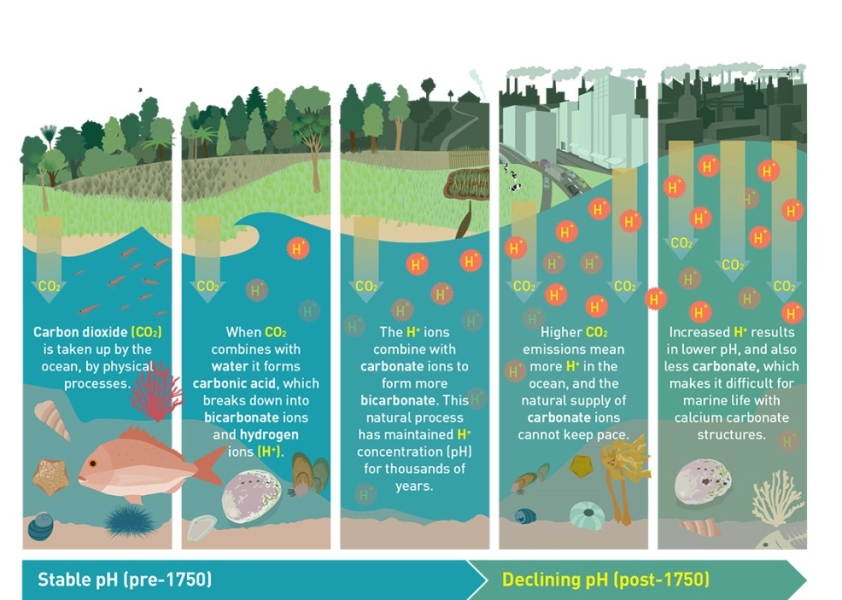On this page:
- Oceans absorb extra carbon dioxide and heat
- What does climate change mean for the oceans?
- Ocean acidification
- Why does ocean acidification matter?
- Ocean warming
- Other effects of warming oceans
The oceans cover 71% of the Earth’s surface and play a vital role in stabilising our climate.
But the increase of carbon dioxide (CO2) in our atmosphere that is causing our climate to change is also driving big changes in our oceans.
Oceans absorb additional carbon dioxide and heat
Our oceans act as a carbon sink, absorbing and storing carbon dioxide as part of the carbon cycle. The oceans also absorb heat from the atmosphere. In fact, more than 90% of the excess heat generated as a result of climate change has ended up in the sea, along with roughly 30% of the carbon dioxide produced by humans from burning fossil fuels since the start of the industrial revolution.
Without the oceans absorbing greenhouse gases, global temperatures would have risen more than they already have.
But what does climate change mean for the oceans?
We know the oceans do a great job of taking up carbon dioxide, but the huge quantity of carbon dioxide humans have been pumping into the atmosphere is more than our oceans can handle. This saturation of the ocean with carbon dioxide is causing the chemistry of the water to change.
Ocean acidification
As the oceans absorb more carbon dioxide, the water becomes acidic. This process is called ocean acidification. The diagram below has more detail about the chemical reactions that take place when this happens.
Why does ocean acidification matter?
Carbon dioxide levels in the atmosphere are causing the ocean to become acidic at a faster rate than organisms in the ocean may be able to adapt.
Many marine organisms, such as shellfish and corals, rely on calcium carbonate in the water to build hard structures like shells and skeletons. Because ocean acidification is reducing the amount of carbonate available to these animals, it is harder for them to grow, maintain and repair these structures.
Ocean acidification is affecting a huge range of organisms including corals, algae, molluscs, phytoplankton and zooplankton. Phytoplankton are at the bottom of the ocean food web, so changes to them will have flow on effects for all other species.
Ocean acidification can also change the behaviour of fish. Recent research has shown that some fish are less able to detect predators in waters that are more acidic.
Watch our video about ocean acidification and research by NIWA and our partners into this important global issue:
You can also read more about NIWA’s research into ocean acidification.
Ocean warming
As well as causing the water to become more acidic, climate change is also causing the surface waters of the ocean to warm. The warming of surface waters is causing changes in water density and also the mixing of warmer, surface water with cooler, deeper water.
Rising ocean temperatures pose many threats to marine life and ecosystems.
All species are adapted to an ideal temperature range at which they are best able to live (known as their optimal thermal window). This dictates where they live in the ocean.
As the oceans warm, this location of the thermal window is likely to shift for many species, causing them to move to new locations. For instance, some species are shifting away from the tropics and nearer the poles to maintain their thermal window.
These movements could cause changes in the way species interact with each other as a result of reorganisation of the marine ecosystem as a whole. For instance, phytoplankton distribution is changing drastically, which is likely to affect the rest of the marine food web.
Other effects of warming oceans
- Marine organisms adapted to warmer waters will expand their range into New Zealand waters and invasive species may displace existing species.
- Fisheries will be affected if target species move. If the average global ocean temperature rises by 2°C, fish catches in the tropics are expected to decrease significantly while those nearer the poles may increase. This has implications for food security as many people in the tropics rely on fish for a large proportion of their protein intake.
- Warming coastal waters are likely to create issues for aquaculture such as reduced production and that, in the longer term, may need to relocate.
- Warmer, more acidic oceans are leading to an increase in coral bleaching, disrupting the vast and complex ecosystems living in coral reefs.
- Sea levels are rising as warmer water occupies a larger volume, and more water is added from melting ice in polar regions.
Ocean acidification classroom activity
Download instructions for an activity exploring pH and adding CO2 to water here.


